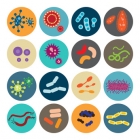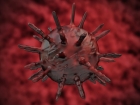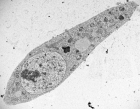What is new in Biotech
Using bacteriophage-derived lysin to target odor-causing bacteria in armpits
29.4.2024 | Press monitoring
Body odor from the armpits comes from bacteria metabolizing sweat produced by the apocrine glands. These bacteria are native to our skin, but the odors produced differ among people. Generally, people use deodorants on their armpits, but perhaps there is a way to get rid of the bacteria. To find out, a research team led by Osaka Metropolitan...
Bioelectronic chip detects vitamins C and D in saliva in under 20 minutes
26.4.2024 | Press monitoring
Vitamins C and D are micronutrients that play a vital role in the immune system as participants in the metabolic pathways involved in combating viruses and bacteria. Monitoring these vitamins in the organism can help ensure their levels are neither deficient nor excessive. However, the methods currently available for this require costly...
Enhanced CRISPR method enables stable insertion of large genes into the DNA of higher plants
24.4.2024 | Press monitoring
Scientists at the Leibniz Institute of Plant Biochemistry (IPB) have succeeded for the first time in stably and precisely inserting large gene segments into the DNA of higher plants very efficiently. To do this, they optimized the gene-editing method CRISPR/Cas, commonly known as "genetic scissors." The improved CRISPR method offers great...
Rice bran nanoparticles show promise as affordable and targeted anticancer agent
22.4.2024 | Press monitoring
Recent studies have demonstrated that plant-derived nanoparticles (pdNPs) that have therapeutic effects can be an effective alternative to traditional cancer treatments. However, no pdNPs have been approved as anticancer therapeutic agents till date. Rice bran is a byproduct generated during rice refining process that has limited utility and low...
New class of antimicrobials discovered in soil bacteria
19.4.2024 | Press monitoring
Researchers have discovered toxic protein particles, shaped like umbrellas, that soil bacteria known as Streptomyces secrete to squelch competitors, especially others of their own species. The umbrella toxin proteins are the latest example of these bacteria's varied, combative strikes on their microscopic rivals. The crowded, diverse bacteria...
Deadly bacteria show thirst for human blood: Research outlines the phenomenon of bacterial vampirism
17.4.2024 | Press monitoring
Some of the world's deadliest bacteria seek out and feed on human blood, a newly-discovered phenomenon researchers are calling "bacterial vampirism." A team led by Washington State University researchers has found the bacteria are attracted to the liquid part of blood, or serum, which contains nutrients the bacteria can use as food. One of the...
Researchers discover new clues to how tardigrades can survive intense radiation
15.4.2024 | Press monitoring
University of North Carolina at Chapel Hill researchers have discovered that tardigrades – microscopic animals famed for surviving harsh extremes – have an unusual response to radiation. Radiation has long been known to damage DNA, and in humans, DNA damage from excessive radiation exposure can lead to diseases. But the tardigrades have an...
Traces of DNA in the stomachs of predatory snails provide new insights into the ecology of placozoans
12.4.2024 | Press monitoring
Due to their diminutive size and inconspicuousness, placozoans are challenging to study in their natural environments. To gain a better insight into the ecology of the animals, the researchers exploited the fact that small shell-less sea slugs from the Rhodopidae family feed on placozoans. Placozoans are among the simplest animals and occur...
Turning microalgae into light-controlled, soft bio-microrobots
10.4.2024 | Press monitoring
Developing highly controllable, deformable and environmentally adaptable soft microrobots is thus crucial for multiple task execution in narrow microenvironments, but selecting highly biocompatible materials to construct these microrobots remains problematic. In a new paper published in Light: Science & Applications, a team of scientists led by...
Fluorous lipopeptides act as highly effective antibiotics for multidrug-resistant pathogens
8.4.2024 | Press monitoring
Lipoproteins, small protein molecules with fatty acid chains, are widely used by bacteria in their battles against microbial competitors. A number of lipoproteins have already been approved for use as drugs. The team led by Yiyun Cheng at East China Normal University in Shanghai aims to amplify this effect by replacing hydrogen atoms in the lipid...
































